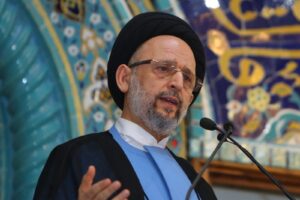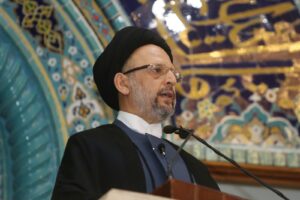Prophet Ibrahim (PBUH) and the difficult test
The first sermon
Allah, The Most Exalted, says in His Glorious Book: And [mention, O Muhammad], when Ibrahim was tried by his Lord with commands and he fulfilled them. [ Allah ] said, “Indeed, I will make you a leader for the people.” [Ibrahim] said, “And of my descendants?” [ Allah ] said, “My covenant does not include the wrongdoers. “Allah, The Most Exalted, speaks the truth. This Ayatindicates that Allah, The Most Exalted, has tried His prophet, Ibrahim, by many difficult tasks; however, Ibrahim performed them in the best possible way ,thus deserving that God would make him a role model for his people(and mankind) and a leader for them. One of these tasks that the Quran pointed out to was to slaughter his only son, Ismail. Nevertheless, Ibrahim did not hesitate to do as he was commanded. However, he had, first, to tell his son so that he would prepare himself “O my son, indeed I have seen in a dream that I [must] sacrifice you, so see what you think.” Ismail replied that he would willingly accept what his father was ordered as long as it is God’s will. He said, “O my father, do as you are commanded. You will find me, if Allah wills, of the steadfast.” He began his answer by saying: “my father “to show that even his death in this way will not change his love to his father. Ibrahim tried to pass his knife strongly on his son’s neck but it did not even scratch it. He was very astonished, but then he was called: And when they had both submitted and he put him down upon his forehead, We called to him, “O Ibrahim,
You have fulfilled the vision.” Indeed, We thus reward the doers of good. Indeed, this was the clear trial. And, We ransomed him with a great sacrifice. Allah, The Most Exalted, has bestowed His mercy on His prophet, just as He did before, when He forbade the fire from hurting him.
Dear loved ones : Allah, The Most Exalted, did not wish that Ibrahim would kill his son .It was a test by which Allah, The Most Exalted, wanted to show how strong was Ibrahim’s belief and how strong was his relation to Him, to the extent that he was ready to sacrifice the dearest thing to him.
It was by no means an ordinary sacrifice. Ibrahim was ordered to slaughter his own son; the son he had after he became an old man (seventy years) and after this son became a strong young man who would support and help him. Ismail also had many virtues and traits that qualified him to be a prophet, that God described when He gave Ibrahim the glad tidings of having a son: And mention in the Book, Ismail. Indeed, he was true to his promise, and he was a messenger and a prophet.
And he used to enjoin on his people prayer and Zakat and was to his Lord pleasing.
Allah, The Most Exalted, has immortalized this incident, when He made slaughtering sacrifices one of the rites of Hajj. By this, He wanted to remind all Muslims that they should adopt this behavior of surrendering to Him and be content and satisfied with what He commands them, in such a way that God’s orders are above all other orders.
Dear loved ones: By surrendering to Allah, The Most Exalted, one’s soul will feel the bliss and tranquility and accept the offering of all sacrifices including one’s life, wealth, fanaticisms, desires, and so on. It will reduce tensions and decrease mistakes and preserve the country and the people, and earn God’s satisfaction and paradise: Or do you think that you will enter Paradise while Allah has not yet made evident those of you who fight in His cause and made evident those who are steadfast.
The second sermon
Worshippers of Allah, The Most Exalted: I advise you and myself, with what Allah, The Most Exalted, advised us, when He said:
O you who have believed, fear Allah and speak words of appropriate justice.
He will [then] amend for you your deeds and forgive you your sins. This is Allah, The Most Exalted’s will to us: to be careful about the words we say, for they might have dangerous consequences.
Many of the words would, once they were uttered, hurt some causes of right, justice and freedom, distort the image of those who said it and violate their dignity, or create hatred and strives and undermine families.
They might even discourage people in defending just causes and abandoning doing rightful deeds and spread falsehood.
We have a great responsibility towards what we say and we will be held accountable for their consequences. Moreover, by being careful about them, we would be able to reduce tensions, build life and become more capable of facing challenges.
We start by the aggravating health crisis whose pressure on the country continues to increase, as a result of the speedy spread of coronavirus.
To confront this pandemic, we continue to bet on the people’s commitment to the measures the government has decreed and the absolute compliance with the safety measures so that we would not reach a point that the country cannot tolerate its results whether on the medical or financial levels.
At the same time, the living conditions continue to worsen, as the commodities prices continue to increase as well as the electricity rationing and the absence of necessities such as fuel and the sanitation of food. On the other hand, we are not witnessing that security forces are doing their job or the judiciary punishing those who were corrupt in the past or those who continue to do so in the present.
Faced by this reality, we might understand the talk of this or that official about the presence of a commercial mafia, or sectarian and political protection .But this does not mean that we should blame others. Rather this calls for engaging in hard work.
The government that took on herself to rid the country from these pressurizing living conditions should shoulder the responsibility and not repudiate it, as long as it did not abandon it. We also call on the political parties in the opposition as well to hold its responsibilities and not be an obstacle against any effort to ease the crisis. Opposition does not mean jeopardizing the efforts of the government. It has to provide alternatives, since it is not the time for settling political accounts, but rather to prevent the collapse of a country whose ruin would not exclude anyone from its repercussions.
We warn that that these sufferings will lead the people to dangerous choices that we ought not reach.
In the meantime, the Zionist enemy continues its aggressions in land, sea and air, the last of which was what took place a few days ago on the Shibaa Farms, under the false pretense of the infiltration of some resistance fighters.
We believe that the confrontation of this situation demands an internal cohesion and consolidation to prevent the enemy from exploiting the internal differences and achieve its goals in Lebanon and the region.
Lastly, we congratulate the army, the country’s protector, on the occasion of its day and call on all Lebanese who are concerned with the country’s sovreignity to make every effort to strengthen the army and remove the obstacles that prevent its arming …
We also believe that the army has the will and determination, but it is still prevented from being strong. Nevertheless, this should not be an escapable fate. Rather, we should try to change it on all levels.




